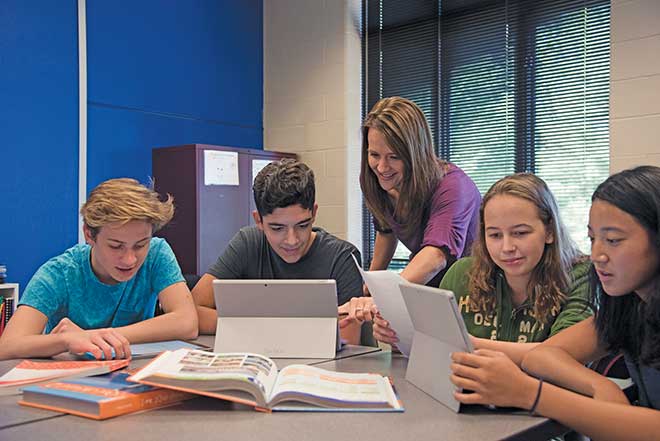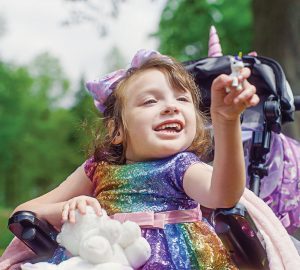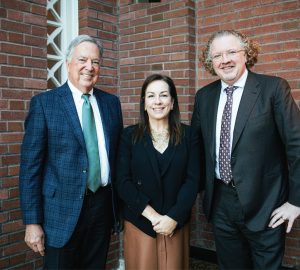A few minutes before 8 a.m., students begin filing into Woods Hall at Whitfield School, and the crowd quickly swells to include all the school’s nearly 500 students and faculty. Even the school’s dog is there. A student calls for order, then groups of students visit the podium to share announcements, and everyone claps and cheers in return. The honor council gives a short presentation on integrity and respect, then everyone heads to class.
 This isn’t the first day of school or a pep rally before a football game. It’s the daily student-led assembly, where children put into practice attributes like respect, leadership and mindfulness. “It’s just one way of living the mission that’s at the heart of what we do at Whitfield,” says head of school John Delautre. As a progressive private school for sixth through 12th grades, Whitfield always has focused on character, he notes, but it recently formalized the process with its Habits of Mind and Heart program, which encourages positive character traits associated with academic, social and emotional growth. “It’s not just knowing right from wrong and having the fortitude to choose what’s right,” Delautre says. “It’s also about the qualities it takes for success.”
This isn’t the first day of school or a pep rally before a football game. It’s the daily student-led assembly, where children put into practice attributes like respect, leadership and mindfulness. “It’s just one way of living the mission that’s at the heart of what we do at Whitfield,” says head of school John Delautre. As a progressive private school for sixth through 12th grades, Whitfield always has focused on character, he notes, but it recently formalized the process with its Habits of Mind and Heart program, which encourages positive character traits associated with academic, social and emotional growth. “It’s not just knowing right from wrong and having the fortitude to choose what’s right,” Delautre says. “It’s also about the qualities it takes for success.”
Character education is an important complement to Whitfield’s rigorous college preparatory academic program, he says, because 60 percent of college students nationwide say they need help coping with the psychological challenges of higher education. “It’s better not to wait until they get to college to cultivate those skills,” says Ginny Fendell, Whitfield’s director of health and wellness. “We can start teaching them habits of character now.” Fendell spent nearly a decade at Washington University, where she ran programs that helped students develop the social and emotional skills necessary to succeed in a high-achieving environment.
Habits of Mind and Heart goes beyond curriculum, says middle school dean Rob Butler. Faculty model appropriate behavior and integrate character messages naturally into lesson plans. “It’s not a program where we download information,” Butler says. “It’s a coaching process.” Although character education now has a name at Whitfield, Fendell says the work isn’t viewed as a separate program. “We don’t just talk about respect one day and then put that lesson away, or give them a list of habits and tell them to go live them,” she says. “This focus on character and right action is woven into every class we teach and every interaction we have with students.”
A tour of the school after the morning assembly highlights the subtle and profound ways character education is being fully integrated into students’ daily lives. For example, there are no bells or hall monitors because students are expected to exhibit self-control. A bin for a school-supply drive is overflowing because community service is a priority. And backpacks and laptops are left unattended in the hallways because students treat peers and their belongings with respect. “We’re not just learning math and science,” says Lily Crandall, a senior. “To be a great Whitfield student, you need to be a goodhearted person. It’s just the culture here.”
Pictured: Students collaborate in Jenny Walter’s Spanish class
Photos by David Cerven with Studio Altius
[Whitfield School is an independent, coeducational college preparatory day school for grades six through 12, located on a 26-acre campus at the corner of Mason and Ladue roads. The school’s demanding academic program prepares its graduates for the best colleges and universities in the nation. Pictured on the cover: Noa Rose, ‘16; Sanjay Chakinala, ‘20; Madison Walsh, ‘17; Max Walter, ‘16; and Taylor Anderson, ‘16. For more information, call 314.434.5141 or visit whitfieldschool.org.]








